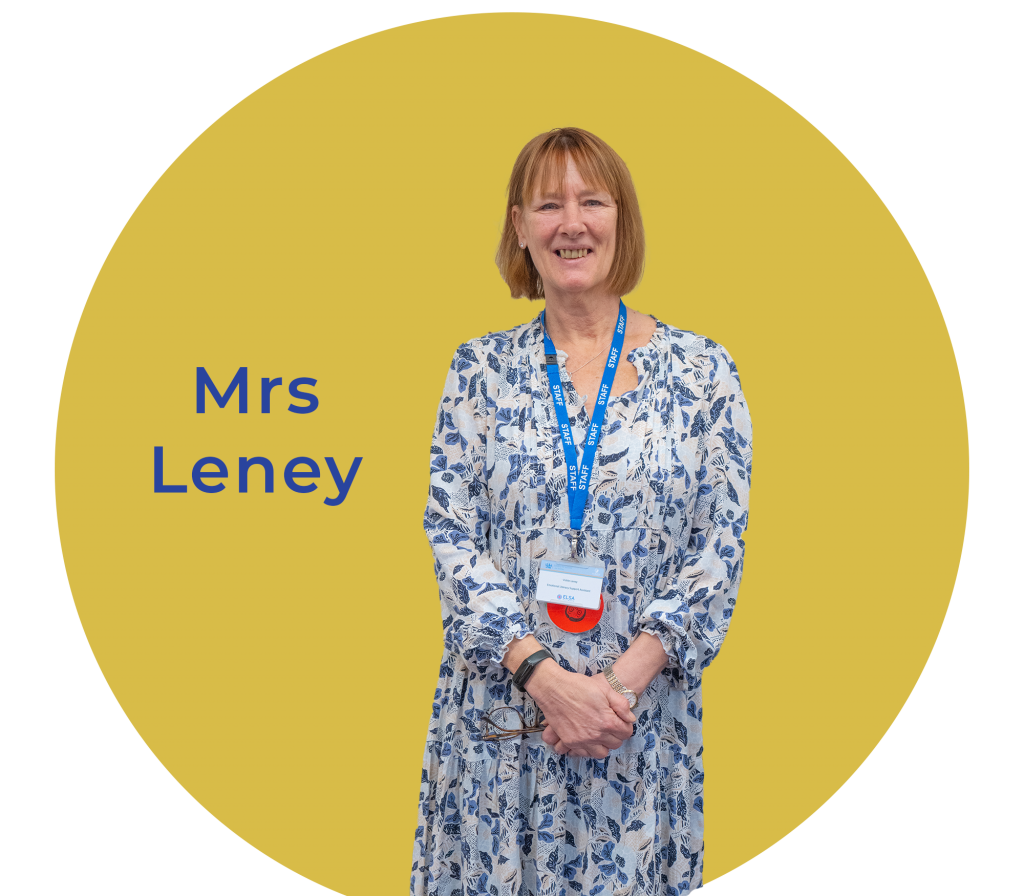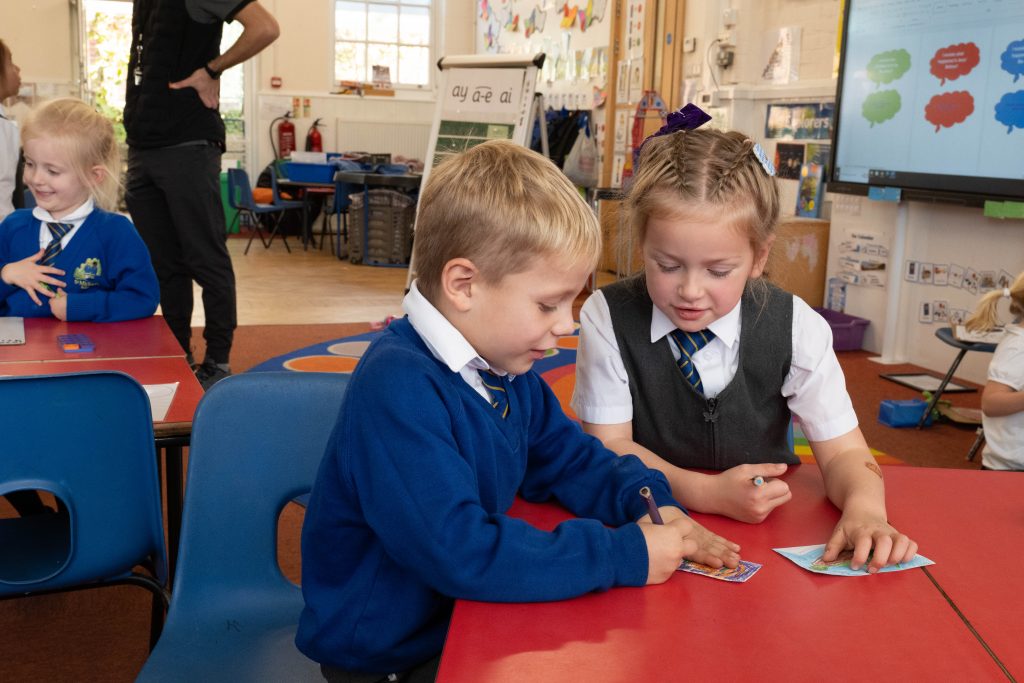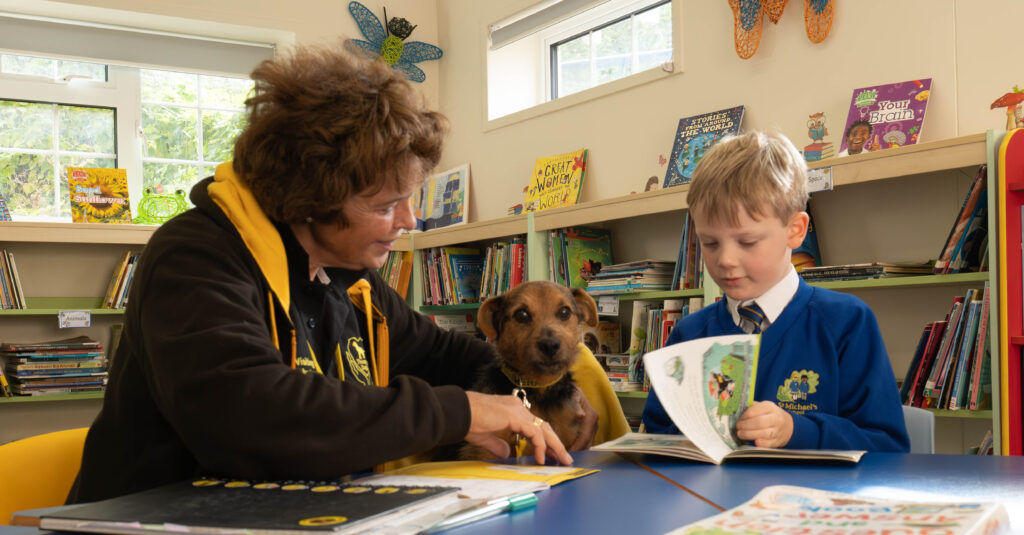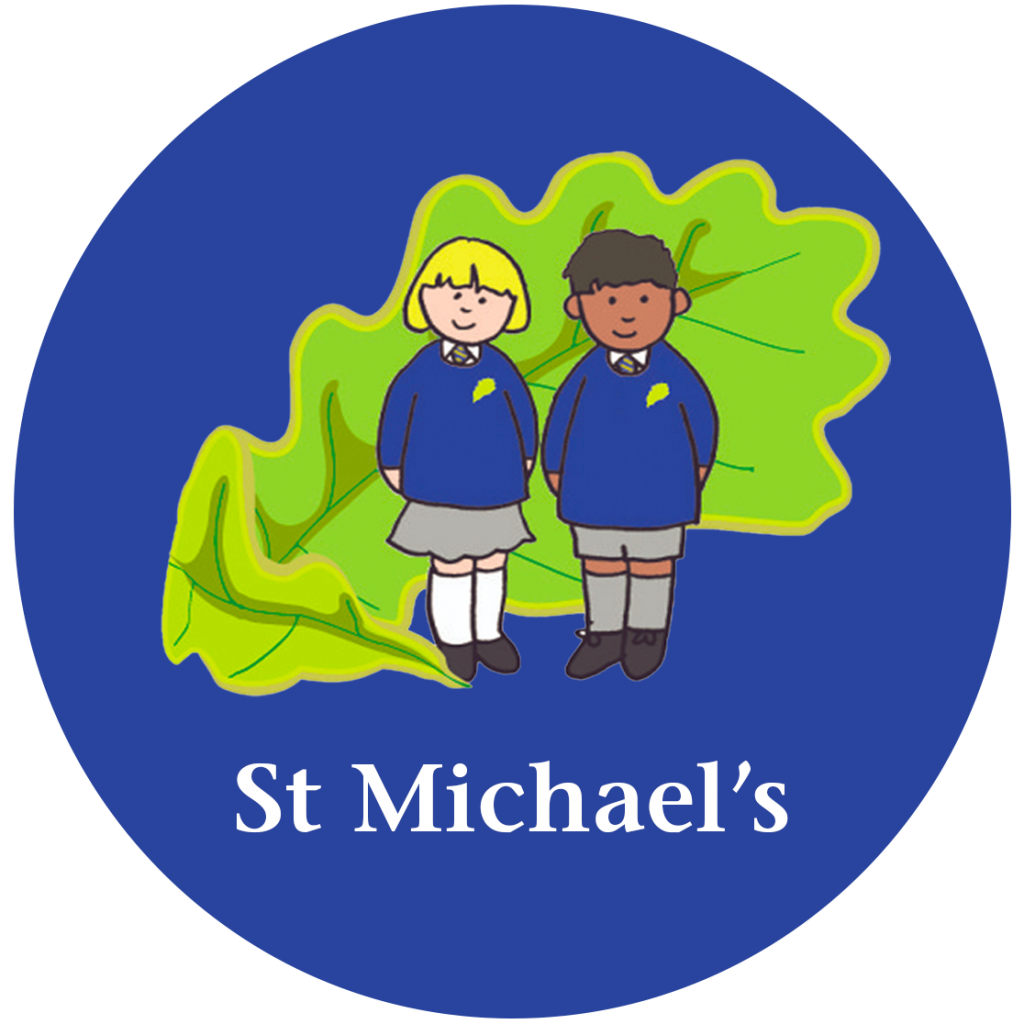English
We believe that if we open our hearts and minds to the possibilities each and every one of us, no matter how small, can make a difference in our school and beyond. The parable of the Mustard seed teaches us that God can do a lot with a little!
Through systematic teaching and creative experiences, all of our young children will learn and grow as writers and readers. The children will immerse themselves in the informative, fascinating and imaginative world of reading, and in writing they will learn both the joy and power of storytelling, narrative writing, poetry and persuasive writing.
We believe that if we open our hearts and minds to the possibilities each and every one of us, no matter how small, can make a difference in our school and beyond. The parable of the Mustard seed teaches us that God can do a lot with a little!
Through systematic teaching and creative experiences, all of our young children will learn and grow as writers and readers. The children will immerse themselves in the informative, fascinating and imaginative world of reading, and in writing they will learn both the joy and power of storytelling, narrative writing, poetry and persuasive writing.
How will our children learn and grown in reading?
We strive to develop the full potential of all our pupils so they become confident, literate readers with a love and passion for reading which we hope will remain with them throughout their lives.
Daily Phonics and Spelling Provision
If children are to develop as competent, fluent readers, it is essential that they have secure understanding of the relationship between letters and sounds.
Phonic skills are essential to developing competent and assertive readers. We follow the systematic approach of Read Write Inc. Staff support this experience by ensuring the modelling of pure sounds at all times.
As children progress through school, they will learn all the 44 sounds and the corresponding letter groups. They will be explicitly taught the skill of oral blending, which is vital for the initial stages of early reading.
Children will rapidly progress to blending sounds together to help them read CVC words. Children will learn digraph and trigraph sounds throughout Early Years and Key Stage 1.
As children become confident at blending sounds, they are taught the skill of blending sounds mentally and at speed by the use of the Read Write Inc. system of ‘Fred in your head’. Children will be exposed to ‘alien’ words throughout Reception and Year 1.
Our consistent and robust approach will provide our children with the foundations to become enthused and passionate readers with a wide-ranging vocabulary.
In Year 2, in addition to revising and consolidating the Read Write Inc. programme, children will be introduced to new spelling patterns, suffixes, and contracted forms of words.
Reading
Reading Team

Miss Chapman – English Lead

Mrs Leney – ELSA
We expose our children to various literature across all curriculum areas. We believe reading opens up a new world for children and gives them the opportunity to explore new ideas, visit new places, meet new characters, develop a better understanding of other cultures, and improve well-being.
Building up the children’s vocabulary gives them the word power they need to become successful speakers and writers as well as confident readers.
Reading is a key life skill and we strive to embed a culture of reading into the core of what we do, providing opportunities for children to read both independently and aloud as well as allowing them the chance to discuss and recommend books they have read to their peers. Reading and quality literature is implicitly interwoven into our curriculum through the use of key texts to expose our children to various genres and famous authors and to enhance the variety of exciting topics that we teach.
Story time is a valued part of the day. Teachers read a story to the class every day. We read a range of modern stories and classics and cover diversity (gender, ethnicity, global figures) throughout these.
Reading Schemes
At St Michael’s, our reading scheme contains a wide variety of different books from different publishers.
The books are colour coded and suitable for all ages from foundation to advanced readers post Key Stage 1. The children’s progress is recorded on a tracking sheet which records the date as to when each child moves up to the next level.
Teachers select the books for the children to read in Reception; in Year 1 and Year 2, once the children have secured the alphabetic code, they select their books from the book area.
Children start on decodable books; these are carefully matched to their phonic knowledge to ensure children make secure and effective progress in reading.
How do we make this happen?
- Daily phonics sessions
- Phonological awareness
- 1-1 reading
- Daily whole class guided reading sessions
- Benchmarking
- Use of online learning platforms i.e. Ed. Shed
- Inviting reading corners
- Focus on reading skills (retrieval, sequencing, prediction, inference and vocabulary)
- Daily story time
- Parents readers
- Children sharing stories (Yr 2 reading with younger children)
- Reading challenges
- Quality cross curricular texts through topics
- World Book Day
- Worship Bible stories
- Daily prayers
- School events (Harvest, Christmas, Easter)
- Pets as therapy sessions for reluctant readers to read to Trumpers
- Phonics workshop for parents – including phonics and reading focus in EYFS presentations (both before entry and on entry)
How do we know this has made a difference?
Children’s reading is formatively assessed on an on-going basis so that next steps are identified and progress recognised – growing green and tickled pink comments are written by staff in the children’s reading record book after each reading.
Early Years Foundation Syllabus (EYFS) Assessment of children’s progress against Development Matters is made on a termly basis. Phonic recognition is checked every half term to enable gaps to be targeted. Statutory assessments are made at the end of EYFS.
In Years 1&2 summative assessments are made at the end of each term to monitor children’s knowledge and understanding of concepts taught. Progress is discussed at termly ‘Pupil Progress Meetings’ and focus children are indicated.


Building up the Children’s Vocabulary gives them Word Power
How will the children learn and grow in writing?
We strive to develop the full potential of all our pupils, so they are able and empowered to become competent and successful writers.
We intend to develop children’s oral communication, reading ability and creativity in order to support this.
We seek to create meaningful and purposeful writing opportunities within all areas of the children’s learning.
We will achieve this through engaging topics, outdoor learning focuses, the use of rich texts and children’s own interests as well as purposeful opportunities in other curriculum areas.
Throughout the year, children explore We strive to develop the full potential of all our pupils, so they are able and empowered to become competent and successful writers. We intend to develop children’s oral communication, reading ability and creativity in order to support this. We seek to create meaningful and purposeful writing opportunities within all areas of the children’s learning. We will achieve this through engaging topics, outdoor learning focuses, the use of rich texts and children’s own interests as well as purposeful opportunities in other curriculum areas.
Throughout the year, children explore 6 core texts which acts as a vehicle to access knowledge, skills and understanding in a range of different subject areas; additional texts will also be used.
Our choice of topics has been progressively planned to ensure they inspire the children when using non-fiction texts and encourage further independent reading.
Fascinating and informative non-fiction texts are shared – these may be cross curricular. For fiction, children are fully immersed in the imaginary world of the text through narrative immersion techniques and drama.
This enables the children to make emotional connections to the text and ensures their learning is memorable.
This approach develops their reading, writing, speaking and listening skills set out in the National Curriculum, as well as developing deeper thinking skills and emotional intelligence.
All children, regardless of barriers to learning, will make good or excellent progress through revisiting key objectives, understanding features of genres through use of success checklists and embedding core writing skills. In addition to this, children will receive appropriate, timely and targeted intervention where required in order to ensure progress.
We aim for our children to keep up rather than catch up.
Writing in Early Years
In Early Years, children will be provided with opportunities to use the rich learning environment both inside and out, to develop their communication & listening skills, imagination, mark-making skills and writing.
Writing at Key Stage 1
At KS1, children will learn to plan, revise and evaluate their writing. To be able to do this effectively, pupils will focus on developing effective transcription and effective composition.
They will also develop an increasingly wide knowledge of vocabulary and grammar. We intend for pupils to leave St Michael’s being able to use fluent, legible and speedy handwriting. We have a clear policy that outlines our approach across the school.
How do we make this happen?
- Daily English lessons
- Daily phonics sessions
- Regular handwriting sessions
- SPAG (spelling, punctuation and grammar) sessions
- Oral story telling
- Use of drama
- Quality texts
- Texts related to topic
- Cross curricular writing
- Guided Reading with a focus on language and audience that will influence writing
- Rainbow writing
- Fine and gross motor skills activities
- Notebooks and paper available for free writing
How do we know this has made a difference?
Formative assessment of writing takes place throughout lessons. Teachers listen carefully, observe, ask questions and review children’s learning as part of every lesson.
Within lessons, teachers are quick to identify any child who may need further support. Children are also part of assessing their journey by marking their learning label, filling in the learning line, colouring their writing stamps either ‘growing green’ or ‘tickled pink’ And ticking off success criteria for the chosen genre e.g. a story, recount, letter, invite, information writing
Misconceptions are identified and addressed rapidly to ensure children made good progress. Teachers have a good understanding in the progression of skills and knowledge in English and can use this knowledge confidently to extend and challenge high attaining pupils.
Early Years
EYFS Assessment of children’s progress to the Early Learning Goal in reading and writing is made termly and is regularly reviewed and next steps are identified. Progress and attainment are noted using photographs and observational notes as well as summative assessments. Statutory assessments are made at the end of EYFS.
Key Stage 1
Key Stage 1 formative assessments are made during each English lesson. This formative assessment is used to inform further planning, identifying next steps in learning and identify children who require further support and challenge. Summative assessments are made at the end of each term to monitor children’s knowledge and understanding of concepts taught. Progress is discussed at termly ‘Pupil Progress Meetings’ and focus children are indicated.
We use the systematic approach of Read Write Inc.
Children will learn all the 44 sounds and the corresponding letter groups, progressing to oral blending, which is the foundation of early reading.
